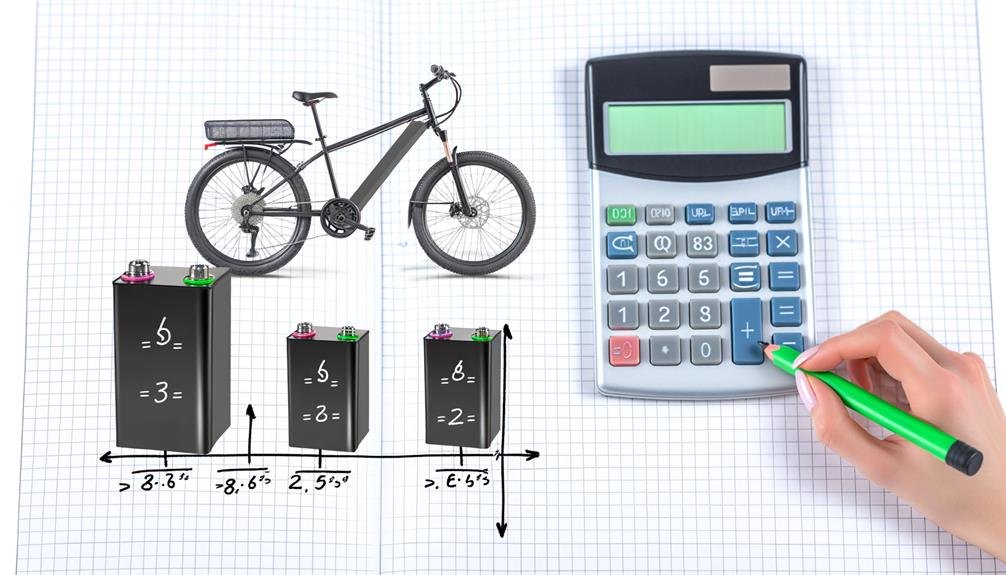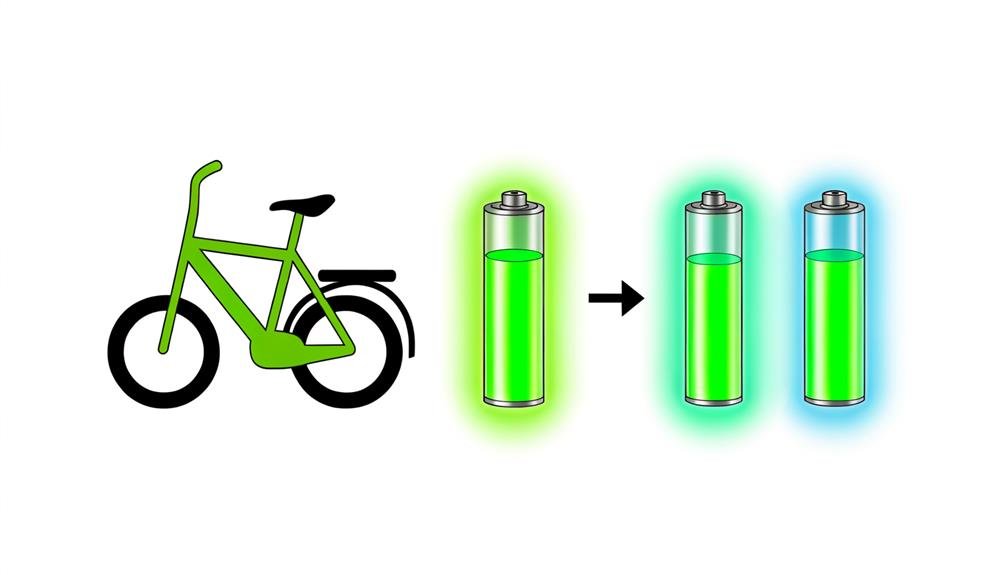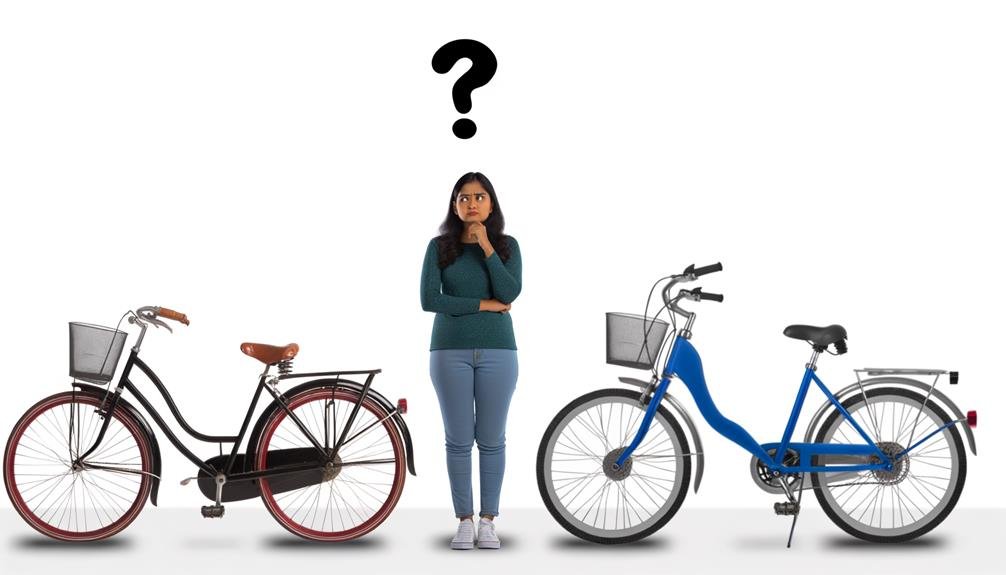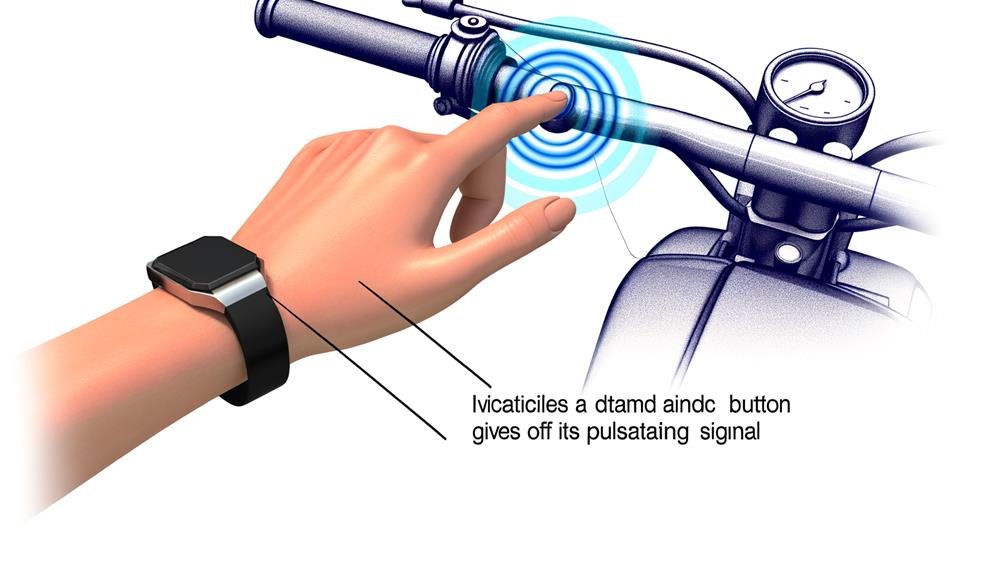Charles Miller is a veteran bike enthusiast with over 12 years of experience dealing with bikes as a mechanic. Despite immense love and expertise for...
Just as the heart pumps life into our bodies, the battery is the lifeblood of an electric bike.
We're here to explore and demystify the question of which size battery is best for your e-bike. It's not as simple as bigger is better, there's a delicate balance to strike.
You have to juggle factors such as weight, cost, and the bike's intended use. But don't worry, we're about to navigate this maze together, shedding light on the deep-rooted intricacies that could influence your decision.
Who knows, you might find some unexpected surprises along the way.
Key Takeaways
- Battery size determines the range of an electric bike, with larger batteries offering greater range and accommodating larger motors.
- Consider factors such as riding style, motor power, speed, terrain, and rider weight when choosing the appropriate battery size.
- Battery capacity is measured in amp hours and energy in watt-hours, with high energy density lithium batteries being beneficial for longer rides.
- Finding a balance between biking needs, battery capacity, and efficiency is crucial when determining the ideal battery size for an electric bike.
Understanding E-Bike Battery Basics
To fully comprehend the intricacies of e-bike batteries, we must delve into the specifics of battery size, its correlation with motor power, and its interpretation in terms of volts, amp hours, and watt-hours.
The battery size is a crucial determinant for an electric bike's range. It's not just about how big the battery pack is; it's about how much energy it can store and how efficiently it can deliver that energy to the bike's motor.
In the realm of battery chemistry, lithium batteries reign supreme due to their excellent energy density and longevity. However, the energy consumption of an e-bike also depends significantly on your riding style and the motor power. More powerful motors drain batteries quicker, necessitating larger battery sizes for the same range.
Moreover, understanding the battery capacity in amp hours and the overall energy in watt-hours is vital. These figures give us an idea of the potential range of an e-bike. However, bear in mind that real-world conditions like speed and terrain can impact the actual range.
Lastly, remember that larger batteries add more weight to the bike, possibly affecting its performance and aesthetic appeal.
Impact of Battery Size on Performance
Delving into the impact of battery size on performance, it's clear that the e-bike's battery, being the most costly component, plays a pivotal role in the bike's overall functionality and efficiency. A larger battery, for instance, delivers more capacity (Ah), impacting the performance by offering greater range. It also accommodates the needs of larger motors, which quickly drain the battery.
Conversely, a small battery might be the best battery for those covering shorter distances, as it eliminates the unnecessary weight and cost of larger batteries. However, it's essential to remember that factors such as speed, throttle usage, pedal assist, terrain, and rider weight significantly influence battery range and, in turn, the performance of your electric bike.
The size of the battery also affects the overall weight of the electric bike, which can alter the bike's aesthetic appeal. Hence, while considering what size battery is best for electric bikes, one should analyze both the short-term and long-term impacts of battery size on performance. The goal is to find a balance between your biking needs, battery capacity, and bike's overall efficiency.
Calculating Ideal Battery Capacity

Frequently, it's crucial that we carefully calculate the distance we'll typically ride and the amount of battery power we'll need to determine the perfect battery size for our electric bike. By doing so, we can ensure we choose the right battery for our needs.
When calculating ideal battery capacity, we must consider various factors such as:
- Motor power: Larger motors typically need larger Ebike Batteries for higher speeds.
- Battery size specifications: These are often expressed in volts, amp hours, or watt-hours. Understanding these can help us select the right battery packs.
- For instance, a Lithium Battery with a high energy density can be beneficial for longer rides.
- Also, we must understand the relationship between battery cells and their amp hours. More amp hours mean more range for our electric bikes.
Factors Affecting Battery Size Choice
Understanding the relationship between battery size, motor power, and riding distance is just the first step; we also need to consider various factors that influence our battery size choice for an electric bike. The best battery size isn't simply the biggest one; it's the one that matches your specific needs. A bigger battery may offer more range and performance, but it's heavier and affects the bike's design.
Speed, terrain, and rider weight are among the factors affecting battery size choice. A smaller battery might suffice for light, flat terrain, but hilly routes or heavier loads need more energy, requiring a larger battery.
Battery size is usually in volts, amp hours, or watt-hours. The amount of energy a battery can store determines how much power it can deliver and for how long. High quality, larger batteries typically support higher motor powers for faster speeds and longer rides.
However, a bigger battery isn't always the best choice. Consider the practicality of the bike's overall weight and aesthetic appeal. Ultimately, your battery size choice should balance your riding needs with cost, as bigger batteries are more expensive.
Prolonging E-Bike Battery Lifespan

To prolong the lifespan of your e-bike's battery, it's crucial to implement proper charging practices, maintain temperature control, and conduct regular maintenance checks. Caring for your battery isn't just about prolonging its lifespan, but also about ensuring your e-bike performs optimally.
Here are some details to consider:
- Proper Charging Practices:
- Use a Battery Charger designed for your battery type. Lead-acid batteries and lithium-ion batteries require different chargers. Using the wrong charger can cause damage to the battery.
- Avoid overcharging. This increases the internal resistance of the battery, which can lead to damage.
- Temperature Control:
- It's best to keep the battery at room temperature. Extreme temperatures can affect the battery's performance and lifespan.
- Avoid storing the battery in direct sunlight or freezing conditions.
Regular maintenance checks are essential in identifying issues early and preventing potential damage. Factors that affect battery lifespan include usage, charging habits, and environmental conditions. Understanding these can help in prolonging e-bike battery lifespan.
Regardless of battery types, proper care and maintenance are key to extending their longevity.
Frequently Asked Questions
What Is a Good Size Battery for an Electric Bike?
"We believe a good electric bike battery size depends on your riding needs. Consider durability, cost, maintenance, lifespan, charging time, safety, brand reliability, replacement frequency, disposal, and environmental impact to make a well-informed decision."
Is 500wh Battery Enough for an Ebike?
We've found a 500Wh battery to be adequate, considering factors like battery longevity, charging speed, and cost-effectiveness. However, performance and maintenance needs vary, so it's essential to balance these with your ebike's weight and environmental impact.
Will a Bigger Battery Make My Ebike Faster?
We've found a bigger battery won't necessarily make your eBike faster. Speed limitations, power consumption, and speed control play key roles. However, it can enhance acceleration, performance, and efficiency, while extending battery lifespan.
How Far Can an Ebike Go on a 20Ah Battery?
We've found a 20Ah battery can take us around 100 miles on average. This, however, depends on speed, terrain, and rider weight. It's a balance between battery efficiency, longevity and the need for battery replacement.
Conclusion
In essence, choosing the perfect battery size for your e-bike is like solving a complex equation. It's a delicate dance between power, weight, cost, and preference.
Pick a larger battery, and you're carrying around a mini power station. Opt for a smaller one, and you risk running out of juice mid-ride.
But don't fret, with careful consideration of your riding habits and needs, you can strike the perfect balance and find the battery that fits your e-bike like a glove.

Charles Miller is a veteran bike enthusiast with over 12 years of experience dealing with bikes as a mechanic. Despite immense love and expertise for his Tacoma, he rides his Trek Ebike more. Anytime you meet him, you’ll either hear him talking about Bikes, or writing about all things bikes and cars on this blog.
More Posts


